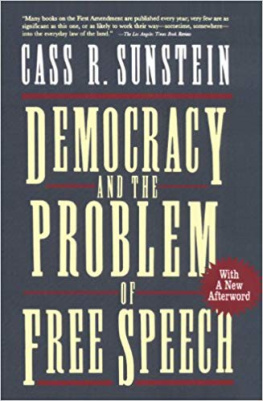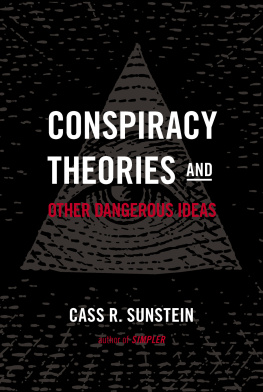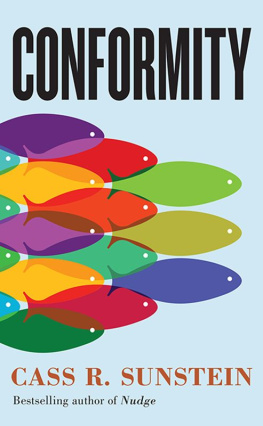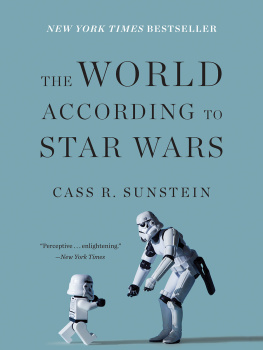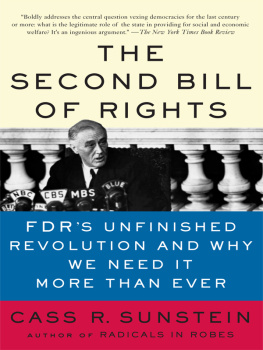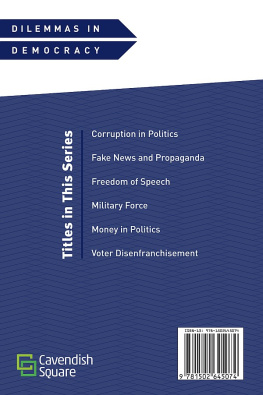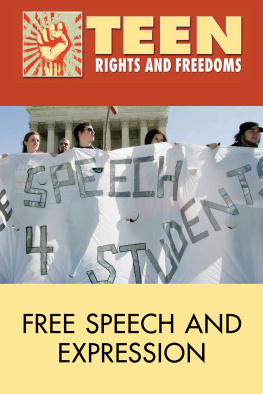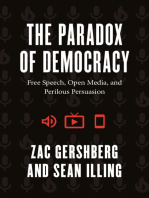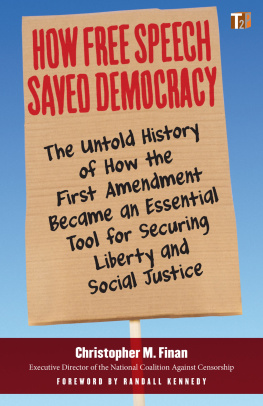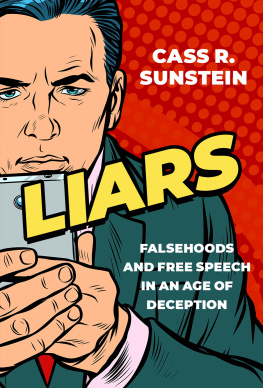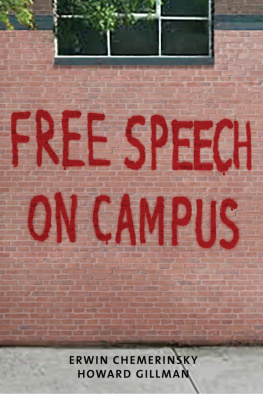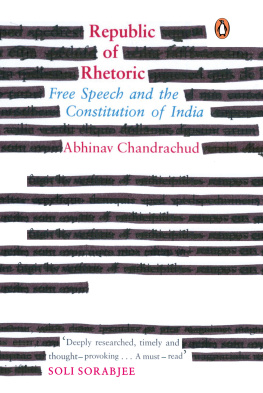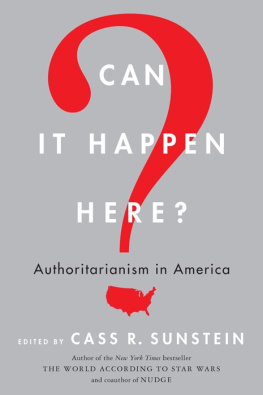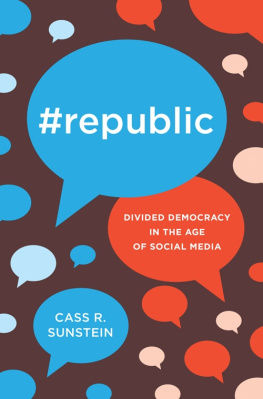DEMOCRACY AND THE PROBLEM OF FREE SPEECH
CASS R. SUNSTEIN
The Free Press
New York London Toronto Sydney Tokyo Singapore
Copyright 1993, 1995 by Cass R, Sunstein
All rights reserved. No part of this book may be reproduced or transmitted in any form or by any means, electronic or mechanical, including photocopying, recording, or by any information storage and retrieval system, without permission in writing from the Publisher.
The Free Press
A Division of Simon & Schuster Inc.
866 Third Avenue, New York, N.Y. 10022
www.SimonandSchuster.com
First Free Press Paperback Edition 1995
Printed in the United States of America
printing number
2 3 4 5 6 7 8 9 10
Library of Congress Cataloging-in-Publication Data
Sunstein, Cass R.
Democracy and the problem of free speech/Cass R. Sunstein
p. cm.
Includes index.
ISBN 0-02-874000-9
eISBN 13: 978-1-4391-0535-1
ISBN 13: 978-0-0287-4000-3
1. Freedom of speech. 2. Freedom of speechUnited States. I. Title.
JCS91.S86 1993 93-5462
323.443dc20 CIP
Contents
Preface and Acknowledgments
HERE ARE SOME RECENT free speech events:
1. A television network plans to show a movie on the topic of abortion. Many advertisers refuse to sponsor the movie. The network decides to run the movie anyway, but it loses a lot of money.
2. A government agency funds artistic projects. In response to a public outcry, it withdraws money from projects that appear to endorse causes associated with feminism and with homosexuals.
3. A male employer makes various suggestive comments to a female employee. He tells her that if she rejects him, she will be fired. She files a complaint with a government agency, contending that her civil rights have been violated. In response, he claims that his right to freedom of speech allows him to say whatever he likes.
4. American companies propose to sell technology to other nations. Some of the technology consists solely of project descriptions, amounting to words; but these words could be used to enhance the military capacities of unfriendly countries. The American government tries to stop the exchange. The companies complain that any restriction would violate the First Amendment.
5. The federal government contemplates various methods for improving democracy in America: imposing legal restrictions on private contributions to candidates and to political action committees; allowing free air time for candidates; and prohibiting broadcasters from disclosing polling results during voting. Critics say that any such reforms would abridge free speech.
6. A well-known tobacco company runs a series of advertisements in which black civil rights leaders from the 1960s say that free speech is important to liberty in America. The advertisements are clearly an effort to lay the groundwork for a constitutional attack on legislative efforts to stop advertising for tobacco products.
7. For many years, the Federal Communications Commission required broadcasters to cover public issues and to foster diverse views. The Commission now concludes that these requirements flatly violate the First Amendment, since they tell broadcasters what they may say.
8. In the aftermath of deregulation of the airwaves, there is an explosion of advertising on television for children. Congress proposes the imposition of a ceiling of about twelve minutes of advertising per hour. The President says that the proposal would violate the First Amendment.
9. At the Kitty Kat Lounge in Indiana, much of the entertainment consists of nude dancing. A prosecutor brings suit against the owner of the lounge, contending that nude dancing violates Indianas ban on nudity in public places. The owner claims that his First Amendment rights would be violated by applying the ban, and he brings this objection to the Supreme Court.
10. There is an increase in incidents of verbal attacks on women, blacks, and homosexuals on the campus of a large university in the Midwest. The university enacts a rule prohibiting hate speech on campus.
11. Various companies create 900 numbers, in which people pay $2 per minute to receive astrological or romantic advice, or to hear prerecorded statements from celebrities. The Federal Communications Commission tries to regulate 900 services to prevent fraud and abuse of children. The relevant companies complain that any regulation would violate the First Amendment.
We are in the midst of a dramatic period of new thought about the meaning of free speech in America. In this book, I deal with these and many other First Amendment problems. My goal is to set out a general understanding of the purposes of a system of free expression, an understanding that will enable us to address the novel challenges to our most precious constitutional right.
The origins of this book lie in Free Speech Now, 59 University of Chicago Law Review 255 (1992), an essay that found a somewhat different incarnation as chapters 7 and 8 of The Partial Constitution (Harvard University Press, 1993). I am grateful to the University of Chicago Law Review and to Harvard University Press for permission to reprint some of that material here. But this book represents a new departure. Although I have retained a number of the original discussions, the basic argument has been much changed. Most sections have been greatly expanded. I have also added new discussions of many topics, including hate speech, corporate speech, and problems of discrimination in free speech law. There is much more detail here about existing fare on the broadcasting media and about possible reform strategies. In addition, my understanding of several areas has changed a great deal, and the discussion has had to be revised accordingly. I have also tried to make the present volume less technical and more broadly accessible. (Readers interested in how the present volume relates to many other issues in constitutional law and theory might consult The Partial Constitution.)
Many friends and colleagues have helped with this book. I cannot thank them all here. But I would like to express a special debt to my editor, Bruce Nichols, for his encouragement and for excellent editorial suggestions; to Gabriel Gore and Richard Madris for research assistance; to Marlene Vellinga for secretarial help; and to the following friends and colleagues for invaluable conversation and comments: Joshua Cohen, Jon Elster, Robert Entman, David Estlund, Stephen Holmes, Elena Kagan, Larry Lessig, Catharine MacKinnon, Martha Nussbaum, Richard Posner, Frederick Schauer, Geoffrey Stone, and David Strauss. For financial support, I am grateful to the Russell Baker Scholars Fund and the James H. Douglas, Jr. Fund for the Study of Law and Government. My final debt is to my students at the University of Chicago, especially the law students in the winter term of 1993, whose comments prompted me to revise the book substantially.
Introduction
CONGRESS SHALL MAKE NO LAW ABRIDGING the freedom of speech, or of the press. More than anything else in the Constitution, the First Amendments protection of free speech and free press symbolizes the American commitment to liberty under law. These fourteen words have inspired and provoked not only Americans, but also reformers and constitution-makers all over the world. By prohibiting any law abridging the freedom of speech, the American Constitution is understood to impose a formidable barrier to official censorshipperhaps the most serious danger to democratic government. The First Amendment, it is often said, forbids government from ordaining any official orthodoxy. It prevents majorities from entrenching their own preferred positions. It even guarantees a large number of outlets for free expression.

